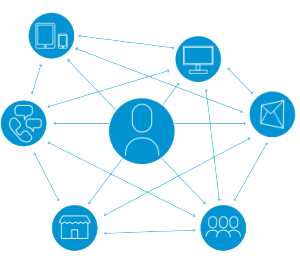 For a while now when describing the rise of using technology to deliver therapeutic services, I’ve found it helpful to include traditional ways of how we work within the definition. This was helped immensely by taking the writing of my hero Douglas Adams into account, and particular his thoughts on technology itself in his seminal 1999 article “How to Stop Worrying and Learn to Love the Internet”:
For a while now when describing the rise of using technology to deliver therapeutic services, I’ve found it helpful to include traditional ways of how we work within the definition. This was helped immensely by taking the writing of my hero Douglas Adams into account, and particular his thoughts on technology itself in his seminal 1999 article “How to Stop Worrying and Learn to Love the Internet”:
“We no longer think of chairs as technology, we just think of them as chairs. But there was a time when we hadn’t worked out how many legs chairs should have, how tall they should be, and they would often ‘crash’ when we tried to use them.“
It could be argued that chairs themselves are a necessity of being a therapist – I’m pretty confident in saying we all use them when communicating with clients. So in considering this traditional way of conducting a therapeutic session, we can include face-to-face work as a technology as well. Adams published that article at around the same time that I joined forces with the British Association for Counselling and Psychotherapy to develop the early Guidelines for Online Counselling and Psychotherapy, the backbone of the ethical advice and competencies for online practitioners we have today, and so I think the time is ripe for us to move on as a profession after over 15 years.
I just did a podcast with the lovely people over at counsellorcpd.com (available early September, check back for the link), and it started me thinking again about how we talk about online therapy as a whole. I described during the podcast how only last year I yet again had the debate about what to call services delivered over the Internet – is it e-therapy, is it teletherapy, is it online therapy…?
Well, how about we take the technology out of the description and just go back to not thinking about that too much? How about we go back to the core of what we do – two or more human beings working together with therapeutic intention to improve someone’s mental health and ability to deal with life’s challenges?
How about we just call it, er, therapy?
So I want us to look at this in a new way, taking into account all the many avenues of communication we have available to us now – be that face-to-face, telephone, email, chat, video, virtual environments or smoke signals. It’s a therapeutic interaction, a relationship, two or more people talking intentionally. It really as simple as it’s always been – we just need to recognise that if we take away the need to think about the screens and keyboards and plugs and chargers and on-buttons and pretty flashing lights, we’re left with the therapeutic relationship itself.
We can offer this relationship in a myriad of ways now, and we can be less restrained by factors such as place or time. The client can choose how and when they want to work, and the practitioner can choose how and when to offer their services. Want to work for 50 minutes in a room with two chairs and a box of tissues? Fine! Want to pick up a telephone and call a helpline spontaneously? Also fine! Want to reach out to your therapist via instant message but not book an entire session? Very fine! Want to journey through a virtual world as an avatar on an epic journey with your counsellor, seeking self-enlightenment? Awesome! That’s just omnichannelling, a word already widely used by marketers looking to improve their customer experience (thanks to ForeSee for the image I borrowed btw).
So I’m going to move further away from the distinction of the offline and the online, take away the need to define therapy by how we deliver it rather than what it is we are actually doing, and if we really need to call it something to remind us we’re not necessarily physically in a room anymore (but it’s OK if we are!), just call it omnichannelled therapy.
I like to think Douglas Adams would be proud of me.
🙂



